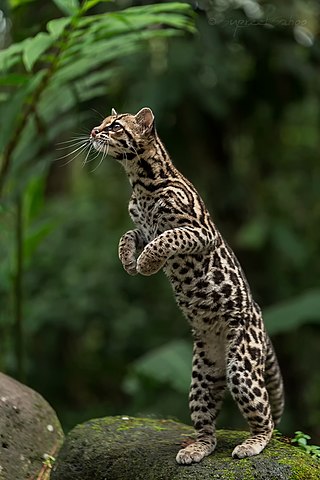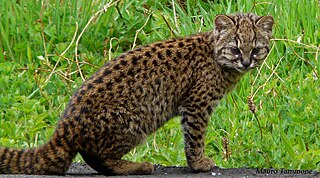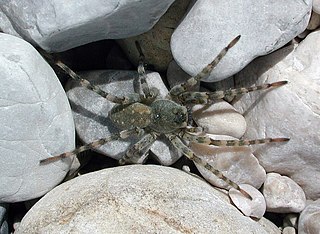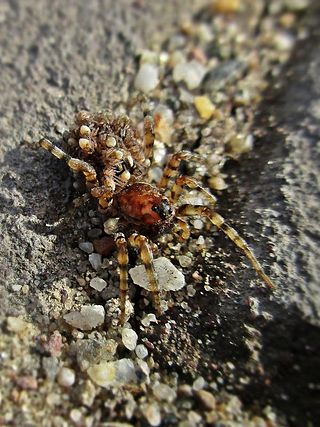
The margay is a small wild cat native to Mexico, Central and South America. A solitary and nocturnal felid, it lives mainly in primary evergreen and deciduous forest.

The ocelot is a medium-sized spotted wild cat that reaches 40–50 cm (16–20 in) at the shoulders and weighs between 7 and 15.5 kg on average. It is native to the southwestern United States, Mexico, Central and South America, and the Caribbean islands of Trinidad and Margarita. Carl Linnaeus scientifically described it in 1758. Two subspecies are recognized.

The oncilla, also known as the northern tiger cat, little spotted cat, and tigrillo, is a small spotted cat ranging from Central America to central Brazil. It is listed as Vulnerable on the IUCN Red List, and the population is threatened by deforestation and conversion of habitat to agricultural land.

The kodkod, also called güiña, is the smallest felid species native to the Americas. It lives primarily in central and southern Chile, as well as marginally in adjoining areas of Argentina. Since 2002, it has been listed as Vulnerable on the IUCN Red List as the total population may be less than 10,000 mature individuals; it is threatened by persecution, and habitat loss and prey base.

Leopardus is a genus comprising eight species of small cats native to the Americas. This genus is considered the oldest branch of a genetic lineage of small cats in the Americas whose common ancestor crossed the Bering land bridge from Asia to North America in the late Miocene.

Arctosa cinerea is one of the most conspicuous wolf spider of central Europe, with a palearctic distribution and also found in Congo. The spider reaches a length of 17 mm, and occurs only on sandy beaches of rivers, lakes and oceans. Its grey-brown color makes for a good camouflage, and so it is not often seen, even if it wanders around during daylight. They dig holes in the ground, which they cover with silk, or hide under rocks.

Arctosa is a genus of wolf spiders first described by Carl Ludwig Koch in 1847. As of February 2019 it contains 169 species.

The Pampas cat is a small wild cat native to South America. It is listed as Near Threatened on the IUCN Red List as habitat conversion and destruction may cause the population to decline in the future.

The Pantanal cat is a Pampas cat subspecies, a small wild cat native to South America. It is named after the Pantanal wetlands in central South America, where it inhabits mainly grassland, shrubland, savannas and deciduous forests.

Leopardus guttulus, the southern tigrina or southern tiger cat, is a small wild cat species native to Brazil, Argentina and Paraguay.

Arctosa alpigena is a wolf spider species in the family Lycosidae with a holarctic distribution.
Arctosa tbilisiensis is a wolf spider species in the genus Arctosa found in Europe.
Arctosa similis is a wolf spider species in the genus Arctosa found in Canary Islands, Morocco, Portugal to Croatia.

Arctosa raptor is a species of wolf spider in the family Lycosidae. It is found in Russia, Nepal, the USA, and Canada.

Arctosa littoralis, the beach wolf spider, is a species of wolf spider in the family Lycosidae. It is found in North and Central America.

Arctosa rubicunda is a species of wolf spider in the family Lycosidae. It is found in the USA and Canada.
Arctosa sanctaerosae, the Santa Rosa wolf spider, is a species of wolf spider in the family Lycosidae. It is found in the United States.

Arctosa perita, also known as the sand bear spider, is a species of wolf spider in the family Lycosidae. They are native to Europe, North Africa, Turkey, the Caucasus, and Russia, however they have also been introduced into Canada. They live on dry, sandy soils or coastal dunes, where they create their burrows.
Arctosa virgo is a species of wolf spider in the family Lycosidae. It is found in the United States.














